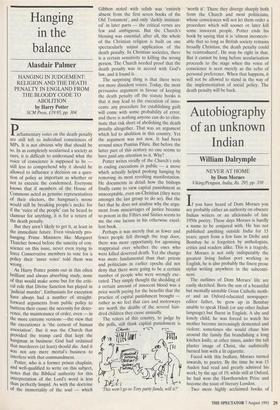Hanging in the balance
Alasdair Palmer
HANGING IN JUDGEMENT: RELIGION AND THE DEATH PENALTY IN ENGLAND FROM THE BLOODY CODE TO ABOLITION by Harry Potter SCM Press, £19.95, pp. 304 Parliamentary votes on the death penalty are still left to individual consciences of MPs. It is not obvious why that should be so. In as completely secularised a society as ours, it is difficult to understand what the voice of conscience is supposed to be still less to comprehend why it should be allowed to influence a decision on a ques- tion of policy as important as whether or not to execute the condemned. Everyone knows that if members of the House of Commons acted as genuine representatives of their electors, the hangman's noose would still be breaking people's necks: for if the 'voice of the people' can be heard to clamour for anything, it is for a return of the death penalty.
But they aren't likely to get it, at least in the immediate future. Even virulently pro- hanging Prime Ministers like Margaret Thatcher bowed before the sanctity of con- science on this issue, never even trying to force Conservative members to vote for a policy their 'inner voice' told them was wrong .
As Harry Potter points out in this often brilliant and always absorbing study, none of that would make sense but for the criti- cal role that Divine Sanction has played in `judicial murder'. Enthusiasts for execution have always had a number of straight- forward arguments from public policy to buttress their cause: the necessity for deter- rence, the maintenance of order, even — in the more extreme versions —the view that the executioner is 'the cement of human association'. But it was the Church that provided the trump card that kept the hangman in business: God had ordained that murderers (at least) should die. And it was not any mere mortal's business to interfere with that commandment.
Potter, who is a former prison chaplain, and well-qualified to write on this subject, notes that the Biblical authority for this interpretation of the Lord's word is less than perfectly limpid. As with the doctrine of the immortality of the soul — which Gibbon noted with relish was 'entirely absent from the first seven books of the Old Testament', and only 'darkly insinuat- ed' in later parts — the critical verses are few and ambiguous. But the Church's blessing was essential: after all, the whole of the Christian religion is built on one spectacularly unjust application of the death penalty. In Christian societies, there is a certain sensitivity to killing the wrong person. The Church needed proof that the death penalty was in accord with God's law, and it found it.
The surprising thing is that there were not more dissident voices. Today, the most persuasive argument in favour of keeping the death penalty off the statute books is that it may lead to the execution of inno- cents: any procedure for establishing guilt will come with some probability of error, and there is nothing anyone can do to elim- inate that risk short of abolishing the death penalty altogether. That was an argument which led to abolition in this country. Yet the argument was not new. It had been around since Pontius Pilate. But before the latter part of this century no one seems to have paid any attention to it. Why?
Potter writes vividly of the Church's role in ending executions in public — a move which actually helped prolong hanging by removing its most revolting manifestation. He documents in detail how the bishops finally came to view capital punishment as unacceptable, even un-Christian (they were amongst the last group to do so). But the fact that he does not analyse why the argu- ment from miscarriages of justice became so potent in the Fifties and Sixties seems to me the one lacuna in his otherwise excel- lent book.
Perhaps it was merely that as fewer and fewer people fell through the trap door, there was more opportunity for agonising reappraisal over whether the ones who were killed deserved death. Yet the change was more fundamental than that: priests and politicians in earlier epochs did not deny that there were going to be a certain number of people who were wrongly exe- cuted. They simply thought the shedding of a certain amount of innocent blood was a price worth paying for the benefits that the practice of capital punishment brought rather as we feel that cars and motorways are worth the deaths of the several hun- dred children they cause annually.
The voters of this country, to judge by the polls, still think capital punishment is This won't go to Tory party lands, will it?' `worth it'. There they diverge sharply both from the Church and most politicians, whose consciences will not let them order a procedure which will sooner or later kill some innocent people. Potter ends his book by saying that it is 'almost inconceiv- able that so long as British society remains broadly Christian, the death penalty could be reintroduced'. He may be right in that. But it cannot be long before secularisation proceeds to the stage when the voice of conscience is seen merely as the echo of personal preference. When that happens, it will not be allowed to stand in the way of the implementation of social policy. The death penalty will be back.


















































 Previous page
Previous page